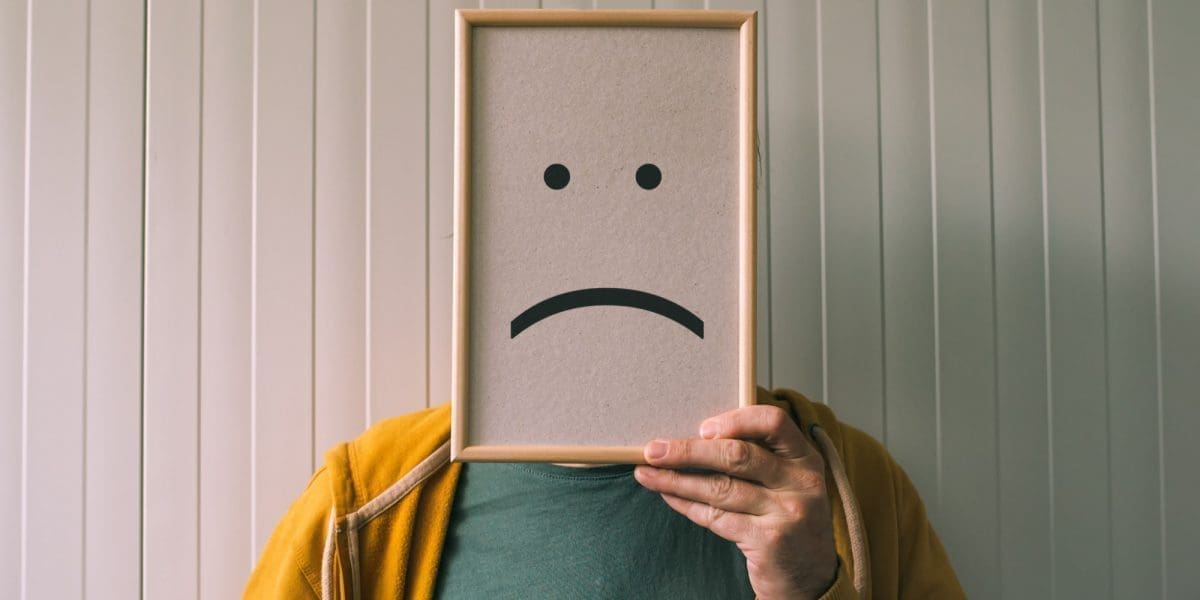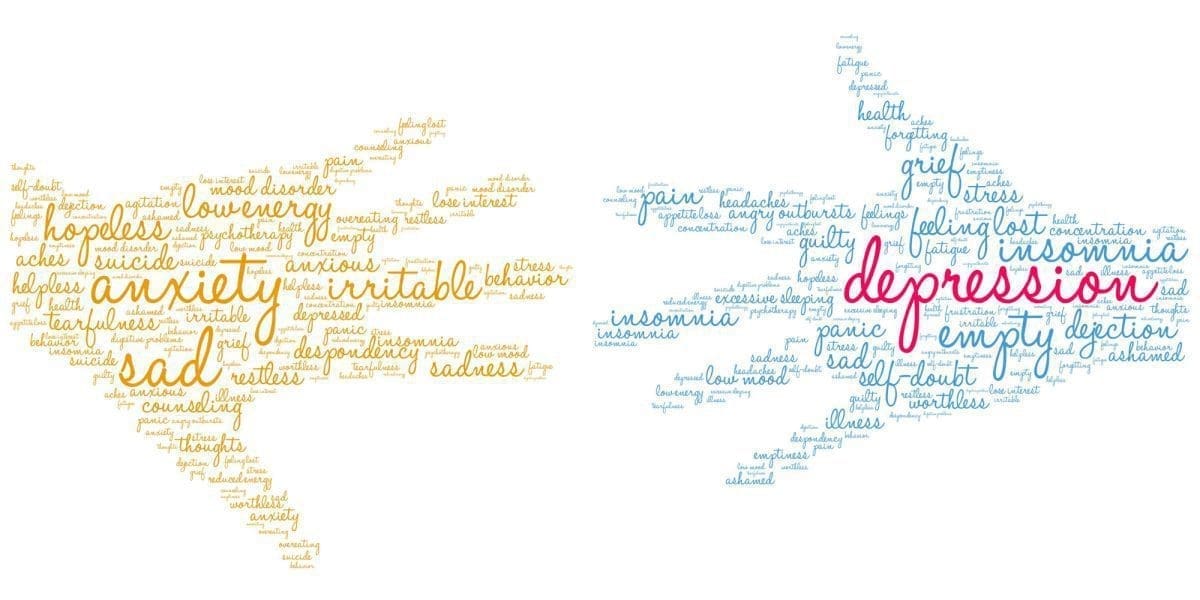Depression and anxiety are two of the most common mental illnesses in the world. Together, they affect millions of people throughout the United States. Due to their prevalence, some people treat them as one and the same. However, the difference between depression and anxiety exists, and it’s crucial to understanding what type of treatment someone needs to recover.
Depression and anxiety are not the same. That’s why the Diagnostic and Statistical Manual of Mental Disorders (DSM), published by the American Psychiatric Association, acknowledges depression and anxiety as two separate medical conditions. Someone may have both, but they can also have one without having the other.
In fact, these conditions are not even classified as the same type of disorder. Depressive disorders and anxiety disorders are two entirely separate types of mental illness. Even then, many people talk about depression and anxiety in terms of how much they have in common. So, what is the real difference between depression and anxiety, and how are they related?
What Is Depression?

Before discussing the difference between depression and anxiety, it is important to understand what both are independently of one another. First, depression is a common mood disorder that affects how someone feels and acts. In more severe cases, its influence can impair someone’s ability to function in daily life.
Many people associate depression with pervasive feelings of sadness, and for good reason. Some individuals with depression do feel an overwhelming sense of gloom. However, depression can also manifest in many other ways.
For example, instead of sadness, some people with depression may not feel anything at all. This feeling of numbness or apathy can also be a sign of a depressive disorder. Similarly, long-term fatigue and a lack of interest in activities that used to excite someone can indicate depression as well.
Symptoms of Depression
One of the best ways to highlight the difference between depression and anxiety is to assess the disparities in their symptoms. In addition to the above, other depression symptoms may include:
- Feeling guilty or worthless
- Insomnia or sleeping too much
- Changes in appetite and/or weight
- Slowed thinking, speech, or movements
- Difficulty concentrating
- Memory problems
- Physical aches with no discernible cause
- Thoughts of death or suicide
The exact symptoms someone experiences depends on factors such as the type of depression they have. Clinic depression can take on many different forms, including major depressive disorder, bipolar disorder, and seasonal affective disorder.
Depression is a varied, multifaceted mental health condition. It is expansive enough to warrant several subtypes, each with their own unique causes and challenges. That being said, anxiety is not one of those subtypes.
And that can be useful, since the stark differences between depression and anxiety make it easier to identify each type of disorder. Both terms may encompass a broad range of experiences, but they each focus on a different aspect and causality.
What Is Anxiety?
Many people experience anxiety from time to time, such as before an important meeting or test. However, not everyone lives with an anxiety disorder. Clinical anxiety is characterized by excessive stress and worrying that persists even without a reasonable cause.
People with anxiety frequently feel restless and nervous. They may also feel a constant sense of impending doom or assume the worst outcome of a situation will always come true. This level of excessive stress is not normal, and when it interferes with someone’s ability to complete their daily tasks, it can indicate an anxiety disorder.
For many individuals with anxiety, physical symptoms play a substantial role as well. This is especially true during acute episodes of anxiety or panic. For example, they may experience nausea, shaking, or lightheadedness.
This is another difference between depression and anxiety. Even though depression may involve unexplainable aches, it typically does not have as many other physical signs. Anxiety, meanwhile, consists of numerous physical tells.
Symptoms of Anxiety
While some symptoms appear in both conditions, the difference between depression and anxiety can be seen in the many other unique effects. For example, additional symptoms of anxiety may include:
- Fatigue
- Sweating
- Increased heart rate
- Insomnia
- Breathing rapidly
- Chest pain
- Trembling
- Gastrointestinal problems
Much like depression, anxiety does not refer to a single mental illness. Instead, it encompasses several subtypes of anxiety disorders. These include generalized anxiety disorder, social anxiety, and panic disorder.
Depending on the type of anxiety someone experiences, the prevalence and nature of their symptoms may vary. For example, someone with social anxiety may show symptoms before meeting someone new, whereas someone with generalized anxiety may worry about their health suddenly declining.
What Is the Difference Between Depression and Anxiety?

At first, it can be challenging to identify the difference between depression and anxiety. They have some symptoms that overlap, and others that often feed into each other. But hopefully, by learning more about their unique symptoms and how they affect people, their differences have started to become clearer.
While depression emphasizes prolonged feelings of sadness or emptiness, anxiety is focused more on worry and stress. People with depression often lack energy and show little to no interest in the things they used to be passionate about. Meanwhile, people with anxiety exhibit distress about the future and potential ways it could go wrong.
Consider this: If a healthy mental state is like a perfectly knit sweater, depression is an unwoven thread. It may feel aimless, without purpose, or worthless, having lost the shape and functionality it once had. On the other hand, anxiety is a knotted, tangled string, full of stress points that seem overwhelming or impossible to undo.
In other words, they are not the same. The end result may be similar in that neither allows for healthy, normal functioning, but the surrounding circumstances are distinct in their own ways.
It is also important to note that neither has to be permanent. The difference between depression and anxiety does not extend to their treatability. No threads have been cut or damaged beyond repair. With the proper support, anyone can overcome both depression and anxiety.
How Are Depression and Anxiety Related?
Even though there is a clear difference between depression and anxiety, they are often paired together in discussions about mental health. On one hand, this may be because both are types of common mental illnesses. In many cases, however, the relationship between depression and anxiety runs deeper than that.
For instance, many people live with both depression and anxiety at the same time. Approximately half of all people with a depressive disorder have an anxiety disorder as well, and vice versa. Such a high rate of comorbidity contributes to why people have a hard time telling the difference between depression and anxiety. They may assume they always go together.
Even though they don’t always appear at the same time, it makes sense as to why it still happens frequently. As mentioned previously, symptoms of depression and anxiety have a tendency to feed into one another. Someone with depression may lack the energy to get out of bed. If they also have anxiety, they may then start to feel stressed or worried about everything they need to do that day.
In that case, staying in bed worsens their anxiety. Even then, though, their depression makes it difficult to get up and complete tasks. There is a clear difference in depression and anxiety when their influences are compared in that manner, but they still work together to further impair someone’s daily functioning.
Depression and Anxiety Treatment Options
Knowing the difference between depression and anxiety helps someone identify which condition someone is experiencing, if not both. This, in turn, is crucial information for them to determine what type of treatment they need to recover.
Talk Therapy
Depression and anxiety share many treatment options, such as cognitive behavioral therapy (CBT) and other types of talk therapy. Therapy is an excellent, adaptable tool used in mental health treatment. It is used to help people recover from and learn to cope with almost any mental illness.
However, therapists often take a different approach to treatment depending on the type of mental health disorder someone has. This is what makes it vital to understand the difference between depression and anxiety. Knowing exactly what someone is experiencing helps professionals provide the correct medical advice and treatment recommendations.
Medication
Similarly, medication is a common treatment option used for both depression and anxiety. Some types of drugs, such as selective serotonin reuptake inhibitors (SSRIs), benefit people with either condition. Others, like benzodiazepines, are primarily used in the treatment of anxiety.
This is another case in which knowing the difference between depression and anxiety ensures someone receives the best treatment option for their needs. It may seem like an easier choice to always prescribe SSRIs since they treat both, but not everyone responds to medications the same way. If someone only has anxiety but doesn’t benefit from SSRIs, it is important for them to know they have other options as well.
Inpatient Treatment for Depression and Anxiety
For a full continuum of effective, evidence-based care, some individuals may consider inpatient treatment for depression and anxiety. Inpatient mental health treatment provides the highest level of support to individuals who struggle to find their footing on their own.
The Willough at Naples is a mental health treatment facility that offers support to people with a wide range of mental illnesses. We know the difference between depression and anxiety, and we can help you no matter which you have.
In addition to many of the treatment modalities outlined above, our inpatient program also includes options like recreational therapy, family counseling, and aftercare planning. We offer flexible treatment plans tailored to suit the needs of every individual in our care.
Contact Us Today
If you wish to learn more about the difference between depression and anxiety, or you’re ready to get help for your mental health, call us today. You can reach our admissions team at (239) 688-3063 or by submitting a confidential contact form.
Depression and anxiety often feel overwhelming. It becomes easy to imagine you will never overcome their influence, but it’s important to remember that you can. With professional help and a strong support system, anyone can regain control of their life and find long-term happiness.

